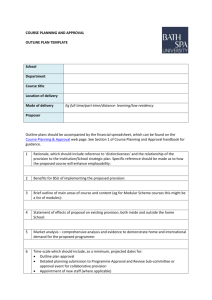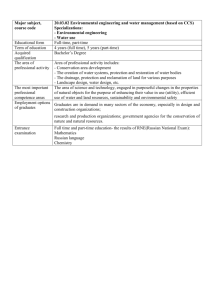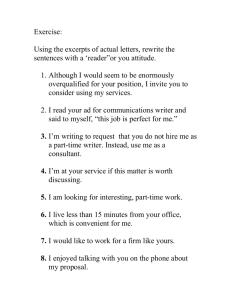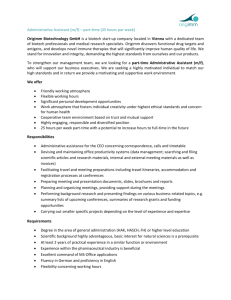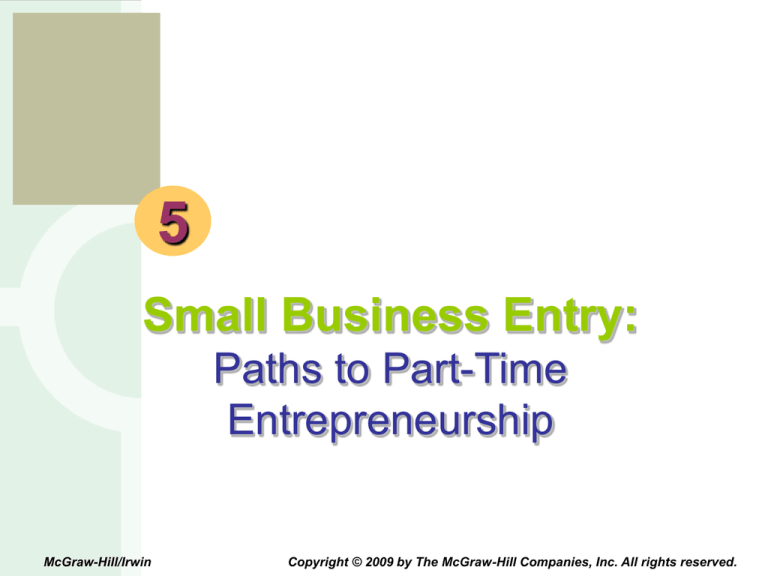
e
s
b
5
Small Business Entry:
Paths to Part-Time
Entrepreneurship
McGraw-Hill/Irwin
Copyright © 2009 by The McGraw-Hill Companies, Inc. All rights reserved.
e
s
b
Chapter 5
Objectives:
• Know when and why part-time entrepreneurship
makes sense
• Learn the four major paths to entrepreneurship
• Understand what it takes to be successful in parttime entrepreneurship
• Learn how to optimize your delegation within the
firm
• Learn the benefits of bootstrapping
• Learn the ethical challenges of part-time
entrepreneurship
• Find out about the challenges of moving from parttime to full-time entrepreneurship
5-2
e
s
b
Chapter 5
• Focus on Small Business: Kathryn Otoshi
– BA in Graphic Design
– Created her own design firm called KO
Design and worked part-time while
freelancing with large corporations while
working for George Lucas’ ILM full-time
– Quit ILM to publish illustrated children’s
books
– Remains part-time between her book
business and KO design with large
corporations
5-3
e
s
b
Chapter 5
Why Part-time Businesses Are Important
• Part-time self-employment: working for yourself
for 35 or fewer hours a week
– Full-time self-employment: 35 or more hours per
week
– This is the way most people start in
entrepreneurship.
– About 3/4 of those starting a business already
work full-time for someone else.
5-4
e
s
b
Chapter 5
Question
Of 25.8 million U.S. businesses, what
percentage are part time?
a)
b)
c)
d)
25
50
75
10
5-5
e
s
b
Chapter 5
• Part-time self-employment is a
major portion of all current
entrepreneurial companies in the
United States
– Around half of 25.8 million businesses
are part-time businesses.
– Volatility: frequency of business starts
and stops
– 6 million sellers online
5-6
e
s
b
Chapter 5
When to Consider Part-time
Entrepreneurship
5-7
e
s
b
Chapter 5
What Kinds of Part-time
Entrepreneurships Exist?
• 4 Major Categories
–
–
–
–
Stands
Homes
Consignment
Mail Order
5-8
e
s
b
Chapter 5
• Stand retail: one of the most ancient
forms of business
– Mentioned in the Bible
– Tend to be semi-permanent
– Advantages: little investment, variety of
locations, quickly established, easily
ended
– Disadvantages: variable income, legal
requirements
– Success Factors: location, inventory
5-9
e
s
b
Chapter 5
• Home retail: parties and door-to-door
– Avon, Mary Kay, Pampered Chef
– Advantages: ease of setup, low cost of startup, ability to work away from home and
employer
– Disadvantages: working on the road, lack of
a base to organize and work, variable
income, finding ways for customers to reach
you
– Success Factors: hosts with good contacts,
matching product to community, closing the
sale
5-10
e
s
b
Chapter 5
• Consignment stores and Auctions: giving
your product to someone else to sell
– Auctions are a variety of consignment stores
– Advantages: permit full-time sales with parttime involvement, low cost, lack of risk,
flexibility
– Disadvantages: high potential for competing
offerings, amount of time before payouts, low
profitability due to seller’s fees
– Success Factors: location that attracts the
right customers, condition of location and
merchandise
5-11
e
s
b
Chapter 5
• Mail order / Catalog sales: offers
customers a description and picture, and
how to order by mail, phone, or online
– Advantages:
•
•
•
•
•
ability to sell on your schedule
low costs
potential for selling to large markets
low inventory investments
targeted customers
– Success Factors: marketing, placing the ad
where the target market sees it
5-12
e
s
b
Chapter 5
Question
Having just enough product on your
shelves to meet the immediate
purchases refers to
a)
b)
c)
Microinventory
Macroinventory
Just-in-time inventory
d)
Mass customization
5-13
e
s
b
Chapter 5
• Microinventory: A set of goods or
services that consists of only one or a
few items
• Just-in-time inventory: Having just
enough product on your shelves to meet
the immediate purchases. This usually
requires frequent shipment from your
supplier.
5-14
e
s
b
Chapter 5
Online Sales
• eBay, largest online sales site, reports over 234
million members worldwide in 2007
• Internet is an attractive setting for entrepreneurs
looking to create a business
• Two major approaches
– eBay or other online site
– Web site of your own
5-15
e
s
b
Chapter 5
Example
Smarts From A Savvy eBay Seller
• Selling on eBay is not a piece of cake
– Must fight to get sales in today’s eBay market
• Cory Kossack – one of the 200 highest-grossing
eBay sellers
– Started in his college dorm room
– Pulled in more than $1 million in revenue with nice
profits as well
http://www.forbes.com/2007/08/09/small-business-ebay-ent-sales-cx_sn_0809startupradioebay.html
5-16
e
s
b
Chapter 5
Success Factors for Part-time
Businesses
• Boundary: separating and balancing
business and home
–
–
–
–
Time management
Use a to-do list
Prioritize
Keep it in its own space (home based)
5-17
e
s
b
Chapter 5
Keisner’s Six Key Ideas for Success
•
•
•
•
•
Do not waste time complaining
Do not aim for perfection
Do not dwell on the past
Minimize time spent in meetings
Schedule and protect quality time with
family
• Schedule and protect time for yourself
5-18
e
s
b
Chapter 5
• Exchange: dealing with others
– Two key groups: Government and
Customers
– Government: registration, licensing,
taxes, zoning
– Customers: central to making sales
• “Sources for Network Connections”
were seen in Chapter Two
5-19
e
s
b
Chapter 5
Pricing and Costing
• Price goods or services to make profits
• Part-time owners often underestimate
costs
• Recognize that your own time has value
• Price against competitor’s offerings
5-20
e
s
b
Chapter 5
Delegation and Outsourcing
• Key is leveraging other people’s time
• Delegation: assigning work to those over
whom you have power
• Outsourcing: contracting with people or
companies outside your business to do work
for your business
5-21
e
s
b
Chapter 5
5-22
e
s
b
Chapter 5
5-23
e
s
b
Chapter 5
Question
Using low-cost or free techniques to
minimize your cost of doing business
refers to
a)
b)
c)
Bootstrapping
Undercapitalization
Outsourcing
d)
Moonlighting
5-24
e
s
b
Chapter 5
Making Do When You Are Starting Out
• Bootstrapping: using low-cost or free
techniques to minimize your cost of doing
business
• Undercapitalization: not having enough
money available to the business to cover
shortfalls in sales or profits
5-25
e
s
b
Chapter 5
Example
Walk This Way
• Most entrepreneurs must finance their own way, by
cutting corners and putting all their earnings back
into the business
• Greg Easley, co-founder of Bottle Rocket Inc.,
poured everything back into his business for 8
months
– Easley says “Bootstrapping is scary, but in
retrospect, it’s worth it
– Learned to use the resources they had
– Valuable lesson is learning how to function on a
shoestring budget
http://www.entrepreneur.com/magazine/entrepreneur/1998/october/16610.html
5-26
e
s
b
Chapter 5
• Key Ideas of Bootstrapping
– Do without
– Cut expenses
– If you need something, borrow, barter,
or rent it
– Substitute a lower-cost alternative
– Ask to stretch out payments
– When using a credit card, limit
purchases
– Always keep track of your cash!
5-27
e
s
b
Chapter 5
Ethics and Part-time Small Business
• Moonlighting: working on your own part-time
after your regular job
– Conflict of interest
– Cannibalizing sales
– Poisoning the well
• Aggrandizing: making your business or
yourself seem more accomplished than it is
5-28
e
s
b
Chapter 5
Moving from Part-time to Full-time
• Key question is usually financial
– Wait until there is a solid income
– Make use of any transition services offered
by the former employer
– Recognize that initially, you will spend all
your time running and marketing the
business
5-29
e
s
b
Chapter 5
?
?
?
Questions?
5-30



